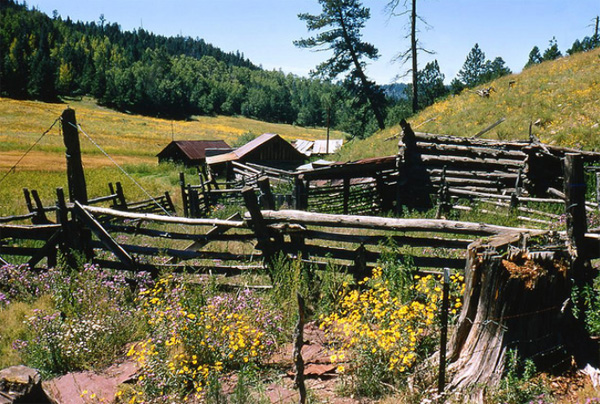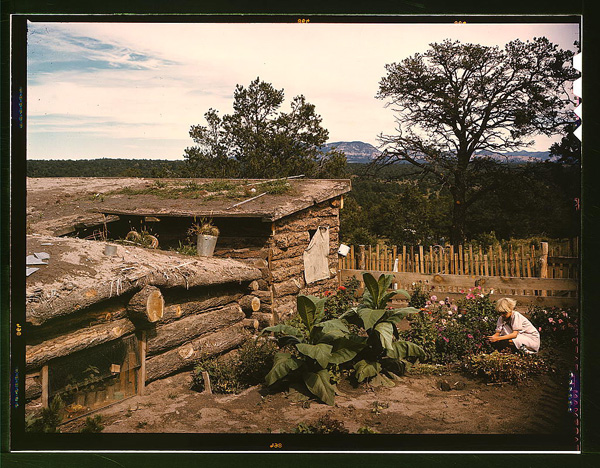
Many of our readers long for building a home on their own land, but the high cost of land often makes the dream impossible. One option is to seek out remote rural land. This is not workable for everybody, that’s for sure. The conditions can be harsh, and I’m not going to give anyone the impression that this route will be easy. I’m just saying its one option to look into if you’re serious about going off-grid. There are remote places in NM, for instance, (and other western states) where land is very inexpensive. You might be able to buy a small lot for $2,000-$5,000. Deals like this may not be advertised. You’d have to drive around a lot looking and checking bulletin boards for real estate listings as you pass through small towns. Codes are not strictly enforced in some remote areas. One guy told me the only enforced code was taking a photo of the septic tank before backfilling. Check online real estate sites for starters and do lots of online research to reduce driving. Challenges include finding good water and soil, land that’s not too remote, and forest fire conditions.
One option is buying a tiny homestead with water and possibly power that’s been abandoned (meaning it’s probably very old). A good well could be worth more than the cost of the land, so be on the lookout for old, rundown places with wells and power. Some places look like they were abandoned decades ago. This can work to your advantage price wise since most people want pristine land. Don’t worry too much about the condition of the house. Even if it can’t be fixed up, you can always park a trailer or build temporary shelter. The old timbers and other materials may be salvageable. Another option, if permissible, is camping on the land in a tent or living out of a van or camper until your house is built.
All the usual caveats apply. Buyer beware. If the land is ridiculously cheap, there’s probably a reason. Research everything carefully and consult real estate experts. There may be easements, legal entanglements due to foreclosure, and unforeseen hazards (flash floods, blizzards, short growing season, local mines that leach toxic chemicals, drought, extremely low water table, poor water quality, etc.). With the current drought situation, forest fires are a major concern in many areas. The local economy may be next to non-existent (you’ll definitely need a source of independent income). Your nearest neighbors may be criminals with a meth lab, or crazy or both. The only play pals for your kids may be scorpions, snakes, bears, coyotes and space aliens. (Lots of UFO sightings in these areas!) And the distance to the nearest town with services may be a deal killer. Everyone needs supplies now and then. Even more so if you’re just starting out and planning to build your own home. The time and cost to drive to town for supplies (where costs are probably higher than a big city) may make the effort impractical. (Although, if you plan carefully you could make a detailed materials list and haul in 99% of everything in one trailer load.)
Tips for finding decent land in rural areas:
– Consider moving to the general area so you have adequate time to search for land.
– Look for land with few or no building codes to reduce construction costs and avoid hassles from inspectors. Note how codes may officially be on the books (like the state wide NM code), but not actively enforced. Talk to locals for detailed advice.
– The best deals might be off the beaten path (on side roads, not main highways). Finding land like this requires more time and effort than cruising down the highway.
– Don’t rush into any “too good to be true” deals. There’s lots of land for sale (especially since the economic downturn), so take your time and use due diligence.
– Avoid areas where they’re drilling/fracking for natural gas. See the Gasland movie.
– Avoid moving to areas near government research and testing sites. They’re notorious for dumping and burying toxic substances.
– Research the minerals rights. You could be forced off your land so a big corporation can access the minerals under your land.
– Ideally the vehicle used to scout for land is in good working order and well maintained. Be sure to take mechanics tools and plenty of extra food, water, blankets, fire starters, spare tires, sturdy hiking boots and other emergency supplies in case of breakdown. Be prepared to hike for miles for assistance. You may be far from cell phone coverage.
– Soil quality is obviously important if you plan to have a garden. Most soil on abandoned properties in western states is probably low quality and would take a great deal of time and effort to boost fertility.
– Relying on water deliveries can cause problems. What if the owner is sick, the company goes bust, or the cost of gas goes sky high? So I think having a good source of water is at or near the top of the list. Be sure to test the water quality.
– I would spend lots of time doing research in advance using tools such as Google Earth and real estate listing. “Let your fingers do the walking” as much as possible. Group potential listings and take a good map to maximize each outing.
– Many small towns have free newsletters and real estate flyers. Once you know approximately where you want to live, you could probably have these mailed to you by local realtors for free or very low cost (postage). Just be aware that most realtors are focused on maximizing profit (who isn’t?) and will likely be primarily interested in selling expensive land. But still, they can be a good source of info and point you in the right direction.
– We’re talking about remote land that takes a lot of time to get to. If realtors/real estate agents are eager to show you something, there’s probably a catch. It’s probably not the dirt cheap type of land you’re hoping for.
– Sometimes you can find lack being sold at auction for overdue back taxes.
– Look for land that adjoins national forests and BLM land. This can essentially magnify available resources (hunting, fishing, firewood, edible plants), provide free recreation, and help deter unwanted commercial development in the area.
– Don’t risk doing something like this if you’re financially on the edge and have a family. You’d want a nest egg to fall back on in case things didn’t work out.
– Especially for families, consider buying or renting land near a small community so you’re not too isolated. You could rent in or near a small town and gradually build your off-grid homestead over time. Just make sure you’re accepted by the community before making a final decision.

To give you an idea of what life may be like in remote areas like this, see the photo above from Awesome Stories.com, and then browse other photos by historical photographer Russell Lee who documented the travails of the Dust Bowl era.
In Lee’s words, “Many of the inhabitants of Pie Town, a community of 250 families, were refugees from the Dust Bowl who arrived in New Mexico in 1935 and had the good luck – or the good sense – to try homesteading instead of migrant work in California. Most of the homesteaders arrived “without any money,” Lee said. “Usually they brought their kids, their personal belongs, some furniture, and some family heirlooms, in cars that barely made the grade.””
Despite all the hazards, pitfalls and imminent hardships, remote areas like this really beckon me. Being close to nature is very important for me. I’ve lived for years in remote areas and have spent countless hours roaming back roads and mountain trails.
Image source: Flickr
Try Google Images and search for “abandoned homestead” and the name of the state for more photos
Google “rural land for sale” for real estate listings
CraigsList
Advice on Low Cost Land in Texas?

I need a cheap place
i’m promoting a wilderness site 60 kms from bangalore india. absolute wilderness and beside a stream and forest banked by small hillocks on the other side.
Hi,
Thanks for the share of useful info and i am looking for this info.
Tip from one of our readers:
“Great post on the rural land in NM. I knew a couple that lived in Weed,NM on top of a mountain. No electricity etc and they were happy happy people. The Lincoln national forest is a great area to be looking for cheap rural land.
http://www.fs.usda.gov/lincoln
(note: check into proximity of military testing sites and risk of radioactive materials)
I like the areas southwest, west and northwest of Taos.
Top photo: The hillside on the right would likely be rocky and unsuitable for a garden. Look for bottom land like on the left for better soil.